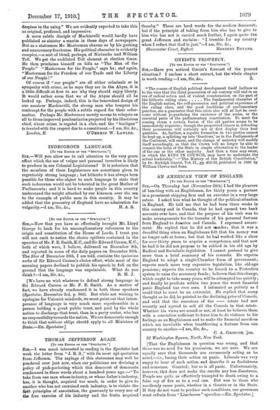AN AMERICAN VIEW OF ENGLAND. [To THE EDITOR OF THE
"SPECTATOR."]
Sfa,—On Thursday last (November 24th) I had the pleasure of lunching with an Englishman, for thirty years a partner in a prominent shipping firm and an executor in a very large estate. I asked him what he thought of the political situation in England. He told me that he had been three weeks in this country and in Canada, that he had opened two bank accounts over here, and that the purpose of his visit was to make arrangements for the transfer of his personal fortune from England to America and Canada. I expressed amaze- ment. He replied that he did not wonder ; that it was a dreadful thing when an Englishman felt that his money was no longer safe at home; but that he had worked like a slave for over thirty years to acquire a competence, and that now he had it he did not propose to be robbed in his old age by Radical and Socialistic legislation. I cannot pretend to give more than a brief summary of his remarks. He expects England to adopt a single-Chamber form of government; expects much more very expensive legislation, like old-age pensions ; expects the country to be forced to a Protective system to raise the necessary funds ; believes that this change, which ought to take many years, will be attempted too quickly; and finally he predicts within two years the worst financial panic England has ever seen. I intimated as politely as I could that he must be an extremist. He replied that many thought as be did, be pointed to the declining price of Consols, and said that the executors of the — estate had met recently and agreed to sell all the Consols in that estate. Whether his views are sound or not, at least he believes them with a conviction sufficient to force him to do violence to his feelings as an Englishman and to make the financial sacrifices which are inevitable when trankferring a fortune from one country to another.—I am, Sir, &c., C. A. Gaiscom, jun.
21 Washington Square, North, New York.
[That the Englishman in question was wrong, and that there was no need for his pessimism, we are sure. We are equally sure that thousands are erroneously acting as he acted,—i.e., basing their action on panic. Liberals wax very angry to bear of such action, and describe it as foolishness and nonsense. Granted ; but so is all panic. Unfortunately, however, that does not make the results any less disastrous. People are quite as effectively trampled to death owing to a false cry of fire as to a real one. But woe to those who needlessly cause panic, whether in a theatre or in the State. If they do not want to produce such conditions, our governors must refrain from "Limehouse " speeches.—En. Spectator.]






















































 Previous page
Previous page